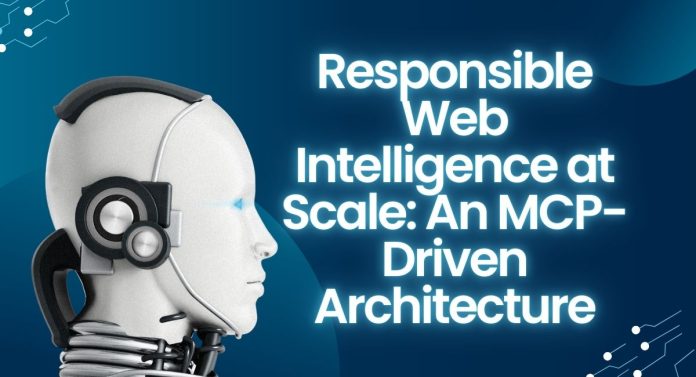In this post, I will talk about responsible web intelligence at scale using an MCP-driven architecture.
Organizations deploying AI-powered web scraping face a fundamental security challenge: providing LLMs with data collection capabilities without creating attack vectors. The Model Context Protocol (MCP) has emerged as the leading solution, with providers like Decodo (formerly Smartproxy) demonstrating secure, scalable implementations across their 125+ million IP infrastructure.
Traditional scraping required manual oversight at every step. Modern AI agents promise efficiency through instructions like “monitor competitor pricing across 50 sites,” but introduce critical risks: credential exposure, uncontrolled data access, compliance violations, and fragmented audit trails.
Table of Contents
MCP Security Architecture
MCP addresses these challenges through a three-tier security model:
Credential isolation: API keys and proxy credentials are managed independently through environment variables, never exposed to AI models. Decodo’s MCP server exemplifies this approach, storing Web Scraping API credentials ($0.95/1K for Advanced subscription) separately from the AI interaction layer.
Scoped permissions: role-based access controls limit tool availability based on user context. Customer service AIs might access product data, while competitive intelligence systems require broader tools under stricter oversight.
Practical Implementation
Decodo’s MCP server demonstrates security-first implementation with three controlled tools:
- scrape_as_markdown: returns sanitized content while filtering malicious scripts
- google_search_parsed: structured search results with built-in content filtering
- amazon_search_parsed: eCommerce data with platform-specific rate limiting
- reddit_post: data from the community platform’s specific posts
- reddit_subredit: information from various topics
Deployment Options
Local deployment: Maximum security through on-premises operation with internal proxy routing, maintaining complete control over data flows and credentials.
Hybrid approach: Services like Smithery enable credential control while leveraging hosted capabilities for scalability.
Hosted deployment: Fully managed servers provide deployment ease while maintaining audit logging and access controls.
Threat Modeling and Controls
Primary Threats
Prompt injection: malicious inputs attempting to manipulate AI agents. MCP’s credential isolation prevents direct access to sensitive information through prompts.
Credential compromise: exposed API keys enabling unauthorized access. Automatic rotation, least-privilege policies, and comprehensive audit logging provide protection.
Data exfiltration: attempts to extract sensitive intelligence. Data classification policies, egress monitoring, and automated content filtering prevent unauthorized movement.
Compliance violations: built-in compliance checking, geographic filtering, and robots.txt validation ensure legal boundaries.
Implementation Best Practices
Defense in depth: combine API key authentication with OAuth where possible. Implement token rotation policies and environment variables rather than hardcoded credentials.
Comprehensive monitoring: audit logging should capture which AI agent made each request, data accessed, timing, and any violations. Performance metrics help identify abuse patterns early.
Graduated access: begin with read-only access to public data. Gradually expand to sensitive sources as confidence grows, minimizing initial deployment risks.
Automated circuit breakers: configure shutoffs for excessive request volumes, prohibited site access, or authentication failures to prevent runaway operations.
Market Positioning
The proxy market has seen security become a key differentiator. While Bright Data and Oxylabs offer extensive enterprise features at premium pricing, providers like Decodo have carved niches through competitive pricing and advanced solutions without complex workflows.
Decodo’s approach of providing “functionality sufficient for most users” at competitive rates enables broader adoption of secure scraping practices across organizations that might otherwise resort to less secure alternatives.
Conclusion
MCP represents a fundamental shift toward security-first AI tool integration. Success requires treating deployment as a security initiative from inception, not a productivity enhancement with security afterthoughts.
Organizations investing in proper authentication, monitoring, and governance frameworks position themselves to leverage AI-powered web intelligence competitively while maintaining compliance. The question isn’t whether AI agents will access scraping tools—they already do. The question is whether organizations implement these capabilities securely with proper controls.
Providers like Decodo allow users with minimal coding knowledge to collect data from various websites without facing CAPTCHAs, IP bans, or geo-restrictions. Providers like Decodo are a perfect match for users looking to enhance their AI tools with real-time data.
INTERESTING POSTS
- Zero Trust Architecture: Enhancing Network Security
- How Companies Leverage Decodo’s n8n and MCP Platform: Streamlining Business Intelligence and Operational Automation
- LLMs on a Leash: Safely Exposing Scraping Tools via MCP
- 4 Reasons You Need Content Filtering For Your Business
- Insurance Requirements Push Atlanta Businesses Toward Professional Cybersecurity Services
- What Is Zero Trust Architecture All About?
- 7 Business Credit Card Tips For Small Businesses
About the Author:
Christian Schmitz is a professional journalist and editor at SecureBlitz.com. He has a keen eye for the ever-changing cybersecurity industry and is passionate about spreading awareness of the industry's latest trends. Before joining SecureBlitz, Christian worked as a journalist for a local community newspaper in Nuremberg. Through his years of experience, Christian has developed a sharp eye for detail, an acute understanding of the cybersecurity industry, and an unwavering commitment to delivering accurate and up-to-date information.









